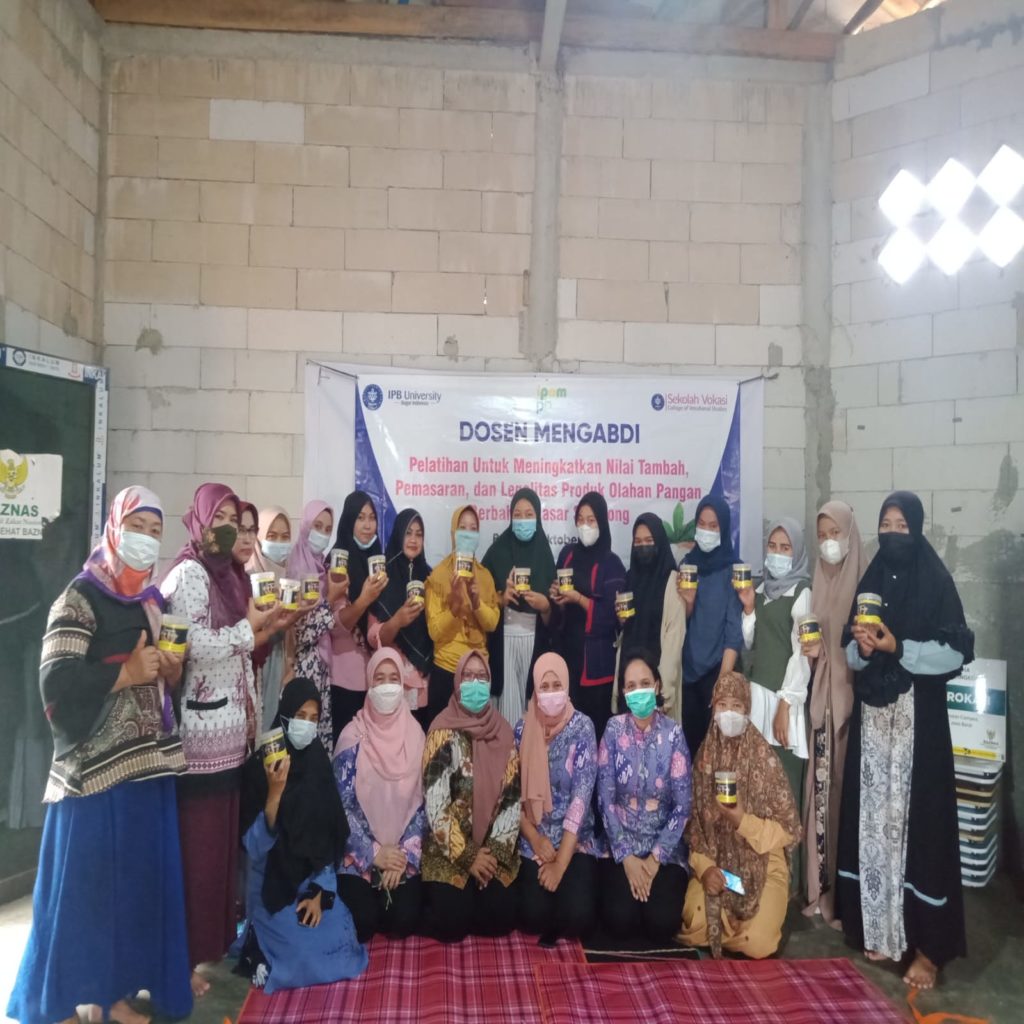
Dr. Dwi Yuni Hastati, STP, DEA; Ani Nuraeni, SPd, MPd; Faranita Ratih L, SH, MH and Ir. Wien Kuntari, M.Si
Cassava is a food commodity that is familiar to the people of Indonesia. This commodity has even become a staple food in several regions in Indonesia. Given the high nutritional content of cassava, the potential for using cassava as a raw material for food products is wide open. Cassava has many benefits, not only as a staple food or as a side dish. Benteng Village, Ciampea, Kab. Bogor, has major economic potential, one of which is cassava. However, this potential has not been developed optimally.
Most of the cassava farmers still sell cassava in raw form. However, there have been a small number of home-scale industries in Benteng Village, Ciampea, Kab. Bogor, which is managed by the women’s farmer group Barokah, has diversified cassava processing and sold it in small and limited capacities. Diversification that has been carried out is still limited to flour mocaf, tapioca flour, chips, and other traditional foods. The flour mocaf, which is produced by the Barokah women’s farmer group, has begun to be processed into food, but only as a mixture, not yet as the main basic ingredient, so there needs to be a diversification of processing with flour as basic ingredients mocaf which have added value and selling power are processed in the form of pastry.
Therefore, this training activity, as part of the 2021 Serving Lecturer program facilitated by the Institute for Research and Community Service of IPB, selected the Barokah women farmer group, which is one of the 12 Circle Villages of the IPB Campus that still needs attention. the achievement of one of the Sustainable Development Goals (SDGs) namely decent work and economic growth. Through this training, it is hoped that it will increase economic productivity and create new job opportunities for Banteng villagers. The leader of the lecturer team serves Dr. Dwi Yuni Hastati, STP, DEA, who is also a lecturer in the Food Quality Assurance Supervisor Study Program, explained that efforts to diversify flour mocaf can provide other added value. “In addition to providing added value, this diversified product must have packaging that is safe, appropriate, attractive, and in accordance with regulations for food products,” he said further.
“The training provided is in processing other mocaf flour from flour mocafthat already exists in the Benteng Village community, into cassava pastry, so that they can get another variant of cassava processed product, in this case mocaf flour, so that it has added value,” said Ani Nuraeni, SPd, MPd, Lecturer of the Food and Nutrition Services Industry Management Study Program, in a community service activity held on Saturday (2/10/2021) in the Barokah women’s farmer group, Benteng Village, Ciampea, Kab. Bogor. This activity was also attended and opened directly by the chairman of the Nusa Educator Community KPN, Mr. Arfan and also attended by the head of the women’s farmer group Barokah Ibu Nugraheni.
Meanwhile, according to Faranita Ratih L, SH, MH, Lecturer of Chemical Analysis Study Program, College of Vocational Studies IPB University; “This training program is one of the efforts to disseminate information to local MSMEs regarding the importance of having a brand as legality and intellectual property, which can encourage this business to be viable, and can encourage the community’s economy,” he concluded.
The success and sustainability of a business as an attraction is the benefits derived from product innovation. In addition to product diversification, it is also necessary to promote cassava-pastry this is a product that has selling points on various social media that they are already familiar with,” said Ir. Wien Kuntari, M.Si who is also a Lecturer in the Agribusiness Management Study Program, College of Vocational Studies IPB University.
During the training, participants are invited to be involved in the process of making cassava-pastry products, and asked for their opinions in a hedonic test to assess the level of participants’ preference for cassava product variants cassava-pastry this. At the end of the training, participants are given a number of raw materials, so that participants can immediately practice it independently. It is hoped that the skills of making, packaging, and marketing cassava products cassava-pastry can further develop entrepreneurial skills Barokah farmer women’s group, in Benteng Village, Ciampea, Kab. Bogor. Lecturers’ activities also involve Ni Made Rusmiati, A.Md, who is in charge of the culinary laboratory of the College of Vocational Studies IPB University.

